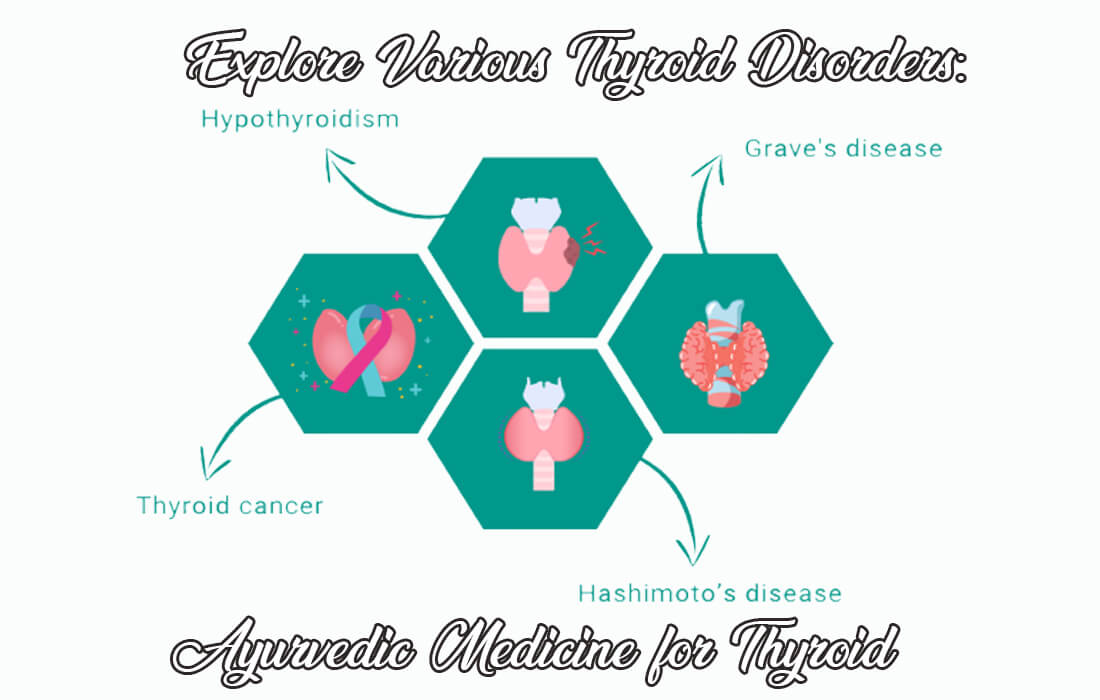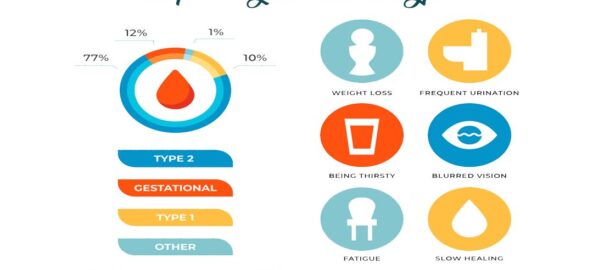
The foundation of seizing control of your health lies in understanding your body and its intricate systems. When your thyroid functions smoothly, you experience optimal well-being. However, if there are disruptions in its balance, it can result in various health conditions. The path to managing thyroid conditions demands attention and empowerment. This guide takes a deep dive into practical strategies, providing insights into ayurvedic medicine for thyroid to handle various thyroid conditions actively.
Understanding Thyroid
The thyroid, a small gland resembling a butterfly situated in the neck, holds significant importance in the human body. At the core of its purpose is the generation of hormones that play a pivotal role in controlling various bodily functions. The hormones thyroxine (T4) and triiodothyronine (T3) directly regulate metabolism, energy levels, and overall well-being.
Different Types of Thyroid Conditions
There are various thyroid conditions, each with its own set of signs. Whether you’re dealing with the intricacies of hypothyroidism, navigating the complexities of hyperthyroidism, or facing autoimmune challenges like Hashimoto’s thyroiditis or Graves’ disease—effective management is essential. It is the key to maintaining a balance that is crucial for sustaining a harmonious and vibrant life. Let’s explore different types of thyroid conditions and their associated signs.
1. Hypothyroidism:
Hypothyroidism, recognized as an underactive thyroid, manifests when the thyroid gland doesn’t generate the necessary thyroid hormones. This deficiency can slow down bodily functions, leading to a range of symptoms:
- Fatigue: Individuals with hypothyroidism often experience persistent fatigue, even after a good night’s sleep.
- Weight gain: The body’s diminished ability to burn calories efficiently due to a slowed metabolism can manifest as unexplained weight gain.
- Cold sensitivity: Hypothyroidism can cause intolerance to freezing temperatures, leading to a feeling of chilliness even in warm environments.
- Dry skin and hair: Lack of an adequate supply of thyroid hormones can lead to hair that is dry and brittle, along with skin that feels rough and dry.
- Muscle and joint pain: Some individuals may experience muscle weakness and joint pain.
- Constipation: Sluggish bowel movements are another common symptom of hypothyroidism.
2. Hyperthyroidism:
Hyperthyroidism, characterized by an overactive thyroid, arises when the thyroid gland generates abundant thyroid hormones. It can lead to an acceleration of bodily functions, accompanied by specific signs:
- Rapid heartbeat: Hyperthyroidism often manifests with tachycardia, presenting as a fast or irregular heartbeat.
- Weight loss: Despite an increased appetite, individuals may experience unexplained weight loss due to the heightened metabolism.
- Nervousness and irritability: Excessive thyroid hormones can lead to heightened feelings of nervousness, anxiety, and irritability.
- Heat intolerance: Individuals with hyperthyroidism may feel excessively warm or sweaty, even in cool temperatures.
- Fatigue and weakness: Individuals may experience fatigue and muscle weakness despite increased metabolism.
- Changes in menstrual patterns: Women with hyperthyroidism may notice irregularities in their menstrual cycles.
3. Hashimoto’s Thyroiditis:
In Hashimoto’s thyroiditis, the immune system mistakenly assaults the thyroid gland, causing inflammation and the progressive breakdown of thyroid tissue. This condition is a common cause of hypothyroidism and is associated with specific signs:
- Swelling in the neck: Enlargement of the thyroid gland, known as a goitre, can result in visible swelling in the neck.
- Fatigue and lethargy: Hashimoto’s thyroiditis can lead to fatigue and a pronounced lack of energy.
- Depression: Some individuals with Hashimoto’s may experience symptoms of depression.
- Memory and concentration issues: Cognitive function may be affected, leading to difficulties with memory and concentration.
4. Graves’ Disease:
Graves’ disease is another autoimmune disorder, but in this case, the immune system stimulates the thyroid to produce excess hormones. It is a common cause of hyperthyroidism and presents with distinct signs:
- Bulging eyes: Graves’ disease can cause a condition known as exophthalmos, where the eyes appear to bulge out.
- Anxiety and restlessness: Individuals with Graves’ disease may experience heightened anxiety and restlessness.
- Tremors and muscle weakness: Fine tremors in the hands and muscle weakness are common symptoms.
- Sleep disturbances: Difficulty falling and staying asleep may be associated with Graves’ disease.
5. Thyroid Nodules:
Within the thyroid gland, there’s a potential for the emergence of abnormal growths or lumps called thyroid nodules. While many nodules are benign, some may be cancerous. Signs of thyroid nodules include:
- Visible swelling: Nodules may cause visible swelling or enlargement of the thyroid gland.
- Difficulty swallowing: Larger nodules can put pressure on the oesophagus, leading to difficulty swallowing.
- Hoarseness: Nodules may affect the vocal cords, causing hoarseness or changes in voice.
- Pain: There is a possibility that some individuals could undergo neck pain or discomfort.
With a grasp of the various thyroid conditions, you are now ready to take charge of proactive management. Identifying distinct signs associated with each condition is vital and integrating ayurvedic medicine for hyperthyroid can further contribute to maintaining a healthy thyroid balance.
Strategies for Managing Thyroid Conditions
1. Regular Monitoring:
Regular monitoring of thyroid function is essential through assessing the effectiveness of ayurvedic medicine for hypothyroidism and adjusting doses if necessary. Routine check-ups enable timely identification of any fluctuations in hormone levels, ensuring prompt intervention to maintain thyroid balance.
2. Lifestyle Modifications:
Certain lifestyle modifications can positively impact thyroid health:
- Regular Exercise: Keeping up with a routine of regular physical activity assists metabolism and contributes to overall well-being. However, individuals with hyperthyroidism should choose exercises that avoid excessive strain on the cardiovascular system.
- Stress Management: Chronic stress can exacerbate thyroid conditions. Practices such as yoga, meditation, and deep-breathing exercises can help manage stress levels.
3. Thyroid-Healthy Diet:
For individuals with autoimmune thyroid conditions like Hashimoto’s thyroiditis, certain dietary adjustments may be beneficial:
- Gluten-Free Diet: Some individuals with Hashimoto’s find relief from symptoms by adopting a gluten-free diet, as gluten may contribute to autoimmune inflammation.
- Anti-Inflammatory Foods: Integrating anti-inflammatory choices such as fatty fish, fruits, as well as vegetables into your diet can play a role in diminishing inflammation related to autoimmune thyroid conditions.
4. Emotional and Social Support:
Navigating life with a thyroid condition can present challenges, and emotional well-being plays a crucial role in successful management. Seeking support from friends, family, or support groups can provide emotional resilience and coping mechanisms.
Conclusion
Understanding the various types of thyroid conditions and their associated signs is crucial for early detection and management. At the same time, effectively managing thyroid conditions involves a multi-faceted approach that includes ayurvedic medicine for thyroid, lifestyle modifications, and emotional support. Individuals with thyroid conditions can achieve better outcomes and lead fulfilling lives by actively participating in their healthcare. These proactive strategies with a holistic approach to well-being contribute to successful thyroid management. Remember that each person’s experience with thyroid conditions is unique, so tailoring strategies to individual needs is key to achieving optimal thyroid health.










